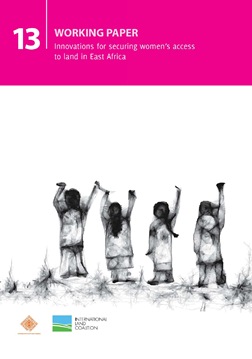Resource information
The importance of land to poor people’s livelihoods cannot be over emphasized. Land provides the foundation upon which people construct and maintain livelihoods. Consequently, secure access to land is a prerequisite for securing livelihoods. Women are the majority of the poor as they have limited access to social and economic resources. This increases their dependence on basic resources like land. The majority of women rely on a land based livelihood mainly as subsistence agricultural producers.
A secured access to land will enable women to improve their welfare and that of their families. Women’s capacity to develop and improve their situation is hampered by limited access to resources like land, financial capital, economic capital, labour and technology. In recognition of this, various initiatives have been undertaken at the government level to improve and secure women’s access to land. The initiatives have had limited impact partially because of the limited resources and effectiveness of government.
Research in East Africa has revealed how community based interventions can not only compliment but also provide more effective means through which government policies can be implemented for the benefit of women. The paper draws on research carried out in Uganda and Kenya to illustrate the ways in which local level and non-governmental institutions can improve women’s access to land by drawing on existing government policies and legislation.
You can download this publication from the website of the International Land Coalition, or below. A Policy Brief is also available.
This work was carried out as part of a 3-year collaborative project entitled “Securing Women’s Access to Land: Linking Research and Action”, coordinated by the International Land Coalition (ILC), the Makerere Institute for Social Studies (MISR) of Makerere University in Uganda, and the Institute for Poverty, Land and Agrarian Studies (PLAAS) of the University of Western Cape in South Africa. This report is part of a wider initiative on Women’s Land Rights. If you would like further information on the initiative and on the collaborating partners, please feel free to contact the International Land Coalition.


